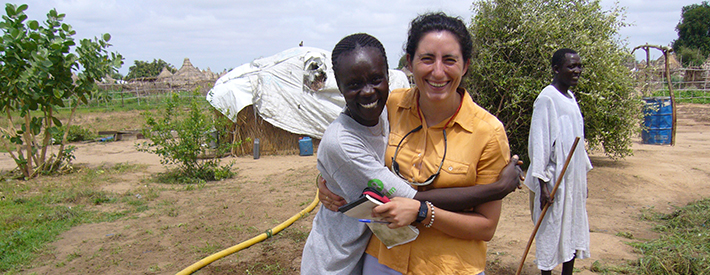News
LATEST NEWS AND EVENTS FROM THE SCHOOL OF ENGINEERING
"At attendance humanitarian the focus is on the person and the environment."
Susana Armendáriz (Tecnun '01) will give a talk on 'attendance humanitarian in natural disasters and war'.

Susana Armendáriz (Tecnun '01) studied Organizational Engineering at the School and will return tomorrow at 7 pm to give a talk on 'attendance humanitarian in natural disasters and war'. Susana will tell in first person her incredible life of volunteer activities in Oxfam, as she was the head of this NGO in Sierra Leone when the Ebola crisis broke out.
How did the opportunity to work for Oxfam come about?
I was working in a private company as head of the manufacturing department department , but my concerns prompted me to look for another job alternative. Inspired by a friend who worked as a journalist in emergencies, I studied an International Master in Humanitarian Action, NOHA, in Deusto. I was offered an internship with Oxfam Great Britain in Chad (Africa), a place where nobody wanted to go (and then I understood why). But once I finished the internship Oxfam GB hired me to work with them.
What drove you to work there?
I was looking for something that would bring me more staff and professionally, because the private company seemed to me too profit-oriented. The human and environmental aspect takes a back seat or is not considered at all, unless regulations require it or the need to improve the image of signature requires it. In the humanitarian attendance the focus is on people and the environment, with all that this implies. Although it is not exempt from cases of corruption and personal or institutional interests that are not always in line with the humanitarian aspect, it still maintains a higher ethical level than the private sector.
What is your work within the organisation?
My main job is the Applied Engineering to water systems, sanitation and health promotion, which includes any of its phases, evaluation, design, implementation and monitoring among others. But in these contexts the responsibilities of your role end up being as broad as the needs on the ground, so you also end up supporting logistics, human resources, finance, etc. Now I work more as an international consultant and 60% focused on projects of biological treatment of solid waste and wastewater.
You were head of Oxfam when the Ebola crisis broke out in Sierra Leone. How did you experience those moments?
Mostly with uncertainty and very little sleep. The first few months many left the country out of fear, so there were too few of us left to want to do too much. The response policy had to be revised from the ground up. The emergency was purely medical and with a subject epidemic still unknown at those levels, so many organizations were outside our usual area of operation. The responsible medical NGOs had reached their capacity limits, which forced the rest of us to step out of our comfort zone and develop new tasks in a context where the risk of infection was extremely high. Oxfam GB began not only to build the Ebola centers, but also to manage them.
What is the most rewarding part of your job?
Tough question, because what I thought would be rewarding, has result been really frustrating. I'm afraid that over the years I have gained skepticism where financial aid humanitarian is concerned, but I recognize that it is a tool with an incredible ability to restore balance and I am still hopeful that we will learn and want to use it properly.
How did financial aid your engineering background qualify you for the job?
All I have done is engineering, so everything I have learned has been very useful. How many times in the field have I regretted not having studied more thoroughly that or that subject. In the field there is a lack of technicians and the internet is not always available to ask Google, so you become the only "expert" available to solve the problem in very disparate areas of engineering.
What do you remember about your time at Tecnun?
It's been a few years since then, but the truth is that back then I was already working so I remember it watch in hand, with the diary adjusted almost to the minute to be able to get to everything and without too much time to interact with my colleagues. I enjoyed the School, although I don't think to its full potential. I have had more contact with the School after finishing, than when I was studying there.
